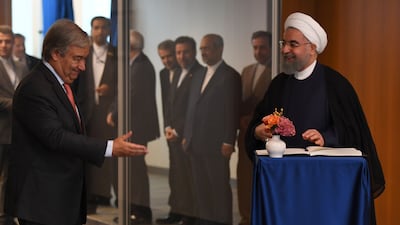The decision taken by president Donald Trump last week allowing the exemption on sanctions imposed on Iran to continue provoked new speculation about the United States' intentions towards Tehran. Summing up the mood, David Sanger of The New York Times wrote that the Trump administration was hesitating to withdraw from the nuclear accord with Iran, which could undermine US alliances and allow Iran to forge ahead with a nuclear program. Instead, "administration officials said they were already trying to refocus on using military and economic leverage to counter Iran's growing influence in the Middle East".
If this assessment is correct, it would represent a welcome change from Mr Trump's approach until now, which has been focused on jettisoning the nuclear agreement (which was signed by several other countries that would continue to adhere to it).
In a speech to the UN on Tuesday, Mr Trump called the agreement "an embarassment", keeping his intentions ambiguous. However, pulling out would do little to curb Iranian power in the Middle East and only leave the US on its own.
A broader plan to contain Iran is indeed required. However, what is unclear is whether the US has the staying power to engage in an effective regional containment policy, which would involve more than the military action and economic sanctions that officials are outlining today.
_________________
Read more
Rouhani warns US that scrapping Iran nuke deal will backfire
Netanyahu: Iran is like a 'hungry tiger unleashed'
Israel to hold drill simulating war with Hizbollah
_________________
The reasons for this are understandable. Iran already has a string of regional alliances, both with Arab governments, such as Syria, Iraq, Qatar, and more ambivalently Lebanon, as well as with Shiite communities in the Middle East. This would seem to place the US at a disadvantage. However, is that true? Washington, in fact, has a much wider array of alliances in the region, with many Arab governments, and can even rely on ties with large communities in each of the Arab countries in which Iran has influence, be it with Kurds, Arab Sunnis and even many Shiites in Iraq, non-Shiite communities in Lebanon, the Kurds in Syria and those opposed to the regime of president Bashar Al Assad.
In other words, the US still has considerable leverage to limit Iran’s reach.
However, the key to doing so does not involve solely imposing sanctions or going to war, both of which are unlikely to have a major impact. Iran has often faced economic sanctions, which has not deterred it from pursuing its political agenda. As for war, the fact that the American public is profoundly opposed to another conflict in the Middle East would be much more likely to harm the Trump administration than Iran.
What would a containment strategy rely upon? Certainly, sanctions and military options should not be ruled out, if only because they constitute political leverage. So, for instance, the US today has military bases across north-east Syria. Iran is eyeing them with suspicion, as they may hinder cross-border movement with Iraq by pro-Iran militias. They also happen to be valuable bargaining chips.
Like the Iranians themselves, then, the Trump administration must carefully weave together a network of assets – alliances, military bases, relations of dependency – that can be called upon in any confrontation with Iran or simply used to limit Iranian geographical expansion.
The US must also work to reinforce its political alliances around the region, which deteriorated dramatically during the years of Barack Obama. For a start, that means trying to end the rift in the Gulf, which Iran has exploited, by acting much more forcefully to find a solution that brings Qatar back into line with its critics in the Gulf Cooperation Council.
_________________
More on Iran and Hizbollah in Opinion
The US should take note that there is more to the Lebanese political mosaic than Hizbollah
The US must find a third way over Iran, one that is neither reticent nor reckless
A war with Hizbollah would essentially mean war with Iran this time around
_________________
It also means, more generally, hindering Iran's desire to open up a passage to the Mediterranean. To a limited extent, Russia was willing to go along with this in agreeing with Washington over a de-escalation zone in southern Syria that excluded Iran and its proxies. But it will also imply, for example, that the US back friendly Syrian Arab groups in eastern Syria as the fighting begins over Deir Ezzor in order to limit Iran's margin of manoeuvre in the border area. It entails ensuring that Iraq's government has firm control over the Iraqi side of the border with Syria.
Indeed, Iraq will remain a major battleground in the effort to contain Iran, which already has great influence there. However, the US has many objective allies even within the Shiite community, from prime minister Haidar Al Abadi to Moqtada Al Sadr to Ayatollah Ali Sistani. Using Iraqi nationalism against Iran is a strong hand the US can exploit.
In Lebanon, some have called for a cut-off of aid to the Lebanese army as a means of harming Hizbollah. That is precisely what should not be done. Lebanon is a complex place in which the US has much latent influence in national institutions. Ending aid would only render the US irrelevant in Lebanese affairs, isolate potential US allies and reinforce Hizbollah.
The administration is formulating its Iran strategy now. As the US learned during the Cold War, containment must be multi-faceted. It takes time, patience and commitment. If the Trump administration is serious about curbing Iran's sway, it should outline such a strategy and stick to it. Mr Trump will not scare Tehran with tweets and vacuous sound bites.
Michael Young is a writer and editor in Beirut
Follow The National's Opinion section on Twitter


